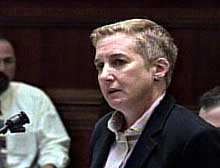-
- Calif. high court appears inclined to rule against same-sex marriages
- MTV Networks announce Logo, network geared toward gays and lesbians
- Aetna sues Abbott over 400 percent rise in AIDS drug price
- GLAAD starts contest to get America to say ‘I Do’ to same-sex marriage
- Missed goals, dwindling participation leads Pittsburgh to cancel AIDS walk
- New Mexico company gives gifts to gay and lesbian couples married in Mass.
- National News Briefs
- World News Briefs
national
Calif. high court appears inclined to rule against same-sex marriages
Ruling expected within 90 days
Published Thursday, 03-Jun-2004 in issue 858
SAN FRANCISCO (AP) – The California Supreme Court appeared ready to conclude that San Francisco Mayor Gavin Newsom abused his powers by issuing 4,000 marriage licenses to gay and lesbian couples earlier this year – but the justices expressed reservations over nullifying the nuptials outright.
While the court did not rule during two hours of oral arguments May 25, several of the seven justices suggested that approving Newsom’s actions would foment legal anarchy and let local officials choose which laws to follow.
“Wouldn’t that be setting a problematic precedent?” asked Justice Joyce Kennard. “Presumably, other local officials would be free to say ... I don’t like that particular law, be it a ban on guns” or another issue.
The justices peppered opponents of the licenses, including a lawyer representing California’s attorney general, and attorneys for the city with questions over how free locally elected officials are to disobey state law.
When San Francisco began issuing the licenses Feb. 12, couples flocked from across the nation before the state high court halted the wedding march a month later. California laws define marriage as a union between a man and woman. In 2000, voters also approved a statewide initiative requiring the state to only recognize a marriage between opposite sexes.
Deputy Attorney General Timothy Muscat found a receptive court when he described San Francisco’s actions as a unilateral rewrite of state law that had “completely taken away” the power of the Legislature and judiciary.
Still, the high court debated at length – and without a clear consensus – how it should treat the married couples if it rules that Newsom overstepped his bounds.
“I have empathy for the situation these people are in, perhaps because of the doing of city officials,” Chief Justice Ronald George said.
The bulk of the arguments explored whether San Francisco had authority to determine whether San Francisco had authority to decide state marriage codes were discriminatory and therefore unconstitutional.
Chief Deputy City Attorney Therese Stewart ticked off cases dating to 1896, which she said showed local officials have properly refused to enforce a state law after determining it unconstitutional. Among those cases were a municipal auditor who refused to pay a local commissioner’s salary and a traffic official who refused to issue bonds.
Stewart argued that the ability of same-sex couples to marry is a “fundamental right” that compelled Newsom to act. She said that such individual rights are important enough that they should prevail over questions of whether Newsom acted within his powers as mayor.
The court is expected to rule within 90 days.
The high court halted San Francisco’s same-sex marriages after the city issued 4,037 licenses at the request of Attorney General Bill Lockyer and gay marriage opponents, who urged the justices to void the marriages as well. On Tuesday, a lawyer for the Arizona-based Christian law firm Alliance Defense Fund argued that Newsom’s “act of disobedience” could lead other local officials to sanction “polygamists.”
While the court earlier acted to halt more same-sex marriages, Chief Justice George suggested his colleagues need not immediately address the issue of what to do about the ceremonies already performed.
“Maybe it’s a little too early to make that determination,” George said.
Justice Marvin Baxter said that he might vote to nullify them. Acknowledging the newlyweds are in a “precarious position,” he said San Francisco officials “created this mess.”
Stewart suggested that the best course would be for the court not to rule on the validity of the licenses. For now, the licenses carry great symbolic value, and virtually no legal weight.
After the hearing, gay rights proponents anticipated the court would rule that Newsom went too far – but hoped they could salvage some victory.
“I am very hopeful, based on the nature of the court’s questions and their sensitivity to this issue, that they could craft a solution where they would find the mayor exceeded his authority without finding that the marriages are invalid,” said Kate Kendell, executive director of the National Center for Lesbian Rights.
When Newsom sanctioned the marriages, he cited the California Constitution’s ban against discrimination, and claimed he was duty-bound to follow this higher authority rather than state laws against same-sex marriage.
The justices, however, said from the outset they would only entertain that constitutional challenge if a lawsuit worked its way to them through the lower courts.
Gay and lesbian couples denied marriage licenses then sued in San Francisco County Superior Court. That lawsuit is unlikely to reach the California Supreme Court for at least a year.
A similar challenge by gays and lesbians in Massachusetts prompted that state’s highest court to endorse same-sex marriages that began there May 17.
|
|
Copyright © 2003-2025 Uptown Publications


